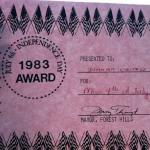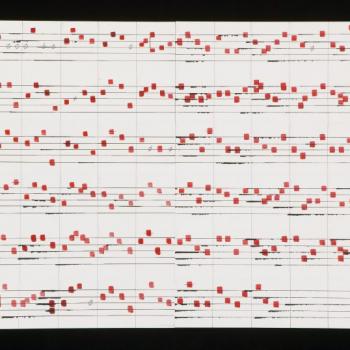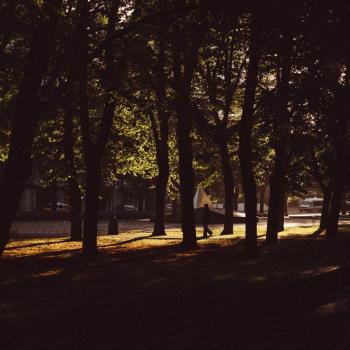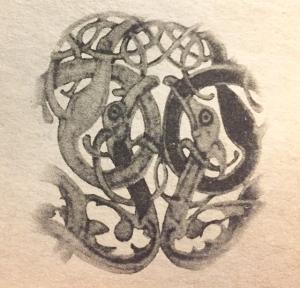
Anyway, without a tractor, we had to bust up the clods and dig out the rows in the field by hand, using hoes and mattocks. Brian was a good manager; always led by example, never asking anyone to do something he wouldn’t do himself. So one day, we were going along digging out rows and busting clods. I was whistling, not paying much attention, when Brian calls out from a couple of rows over.
“Dude, are you whistling Dixie?”
I was whistling Dixie.
“Wow, I don’t know where that came from,” I said. (If I had to guess, I’d say I’d probably just finished whistling The Battle Hymn of the Republic. Kind of hard to separate those songs in my mind. Thanks, Ken Burns.) Brian and I looked at each other, and we laughed.
That memory has followed me back to America. My dad’s family comes from the western part of Virginia. One of my great aunts owned the first integrated diner in their town, and my grandmother worked there. A few generations earlier, however, three of my dad’s four grandparental lineages owned slaves. The Ferrells were subsistence farmers, who likely did not live a whole lot better than their slaves; other branches of the family were better off. When I was a teenager, we went to visit the old farmhouse of one of the wealthier clans. I remember the steep, knee-high stairs inside the house. I don’t remember the cemetery full of unmarked graves or the stone in the front yard where slaves were sold. I would like to think my ancestors were decent people. I would like to think they did not abuse their slaves. The stories I hear, however, say something different, and wishes won’t erase their complicity in this monstrous institution.
I have often wondered what they might think about me though. In their day, white men shipped Africans to America where they were sold to work hard labor on farms and plantations. They were considered subhuman, treated as property. Fast forward 200 years or so, and one of the descendants of these slaveholders voluntarily takes a 6-month leave from a comfortable office job as an editor, travels to Nigeria, and works side-by-side with Nigerian nationals on a farm, busting clods. He would go with the support of his parents, brother, cousins, aunts and uncles, grandparents, and the rest of his extended family. And many of them, along with his friends, would offer financial support to enable him to do this. I wonder what my ancestors would think. Could they understand that decision? What would they think of the world I live in, which provides the context and opportunity for that decision? A world where slavery is outlawed, but racial conflicts still rear their heads. Would they support the trips I’ve taken to Africa? I don’t know.
I can’t claim to have done Africa any great service. Brian and I used to laugh at how we were kind of the boat anchors on the team. Brian at least had his business acumen to offer; most of the time I was a cheap grunt and not a very good one. Our Nigerian colleagues could pound out five rows in the time it took me to finish one. They were the ones carrying the load, the guys who had the skills to get things done in that environment. They were smart, tough, hard-working, and by comparison I was barely a step above deadweight.
Moreso, they were kind to me—a not particularly useful foreigner with a whole lot of baggage. I wish I could go back and tell them about my family. I wish I could say I was sorry.
There is a mindset in some areas of the west that sees itself as Africa’s savoir. That the people there need us and that we’re doing some great work and making great sacrifices when we take service trips there. Or maybe we’re just trying to do penance for our past sins. Perhaps we’d feel better, if we had someone to put on a pedestal. Or perhaps we could pretend to be better martyrs, if we could shoulder all the blame ourselves. (Like when the CIA ordered the assassination of Patrice Lumumba, the democratically elected Prime Minister of the DRC, and replaced him with a despot who would drain the country dry over the next 30 years, plunging it into a decades-long civil war. Oh wait, but Lumumba was in bed with the Soviets, so that makes it OK.)
But what do I know, really? I’m serious. I don’t know how to make sense of all these issues. The deeper you dig, the messier it gets, and at the end of the day, we all have blood on our hands. Ultimately, I can’t speak for anyone else, but I’m pretty sure Africa doesn’t need me. I can’t erase the past, and I can’t undo the sins of my ancestors and the society I live in. So what’s the point of going then? In spite of all these things, I’d like to think maybe I could do a little good or accomplish something redemptive, but I’m in no position to judge on that account. So I don’t know. I have grown to love Africa though. I hope I would return, someday. And I hope Africa will take me back.
David Ferrell is a writer and developmental editor, having worked primarily in academic/educational publishing. He cemented his love for Africa when he visited Kenya in 2008 and then lived in Nigeria for 6 months in 2012. He loves the World Cup and is very sad that there are no more African teams to root for. He currently lives in South Carolina or maybe North Carolina. It’s hard to say.
Joanna Penn Cooper is a poet and essayist and author of The Itinerant Girl’s Guide to Self-Hypnosis and What Is a Domicile. She curates the “Approaching Mystery” series for Sick Pilgrim, publishing flash essays by writers encountering the unseen, the uncanny, and the unresolvable. She lives in Durham, NC.











